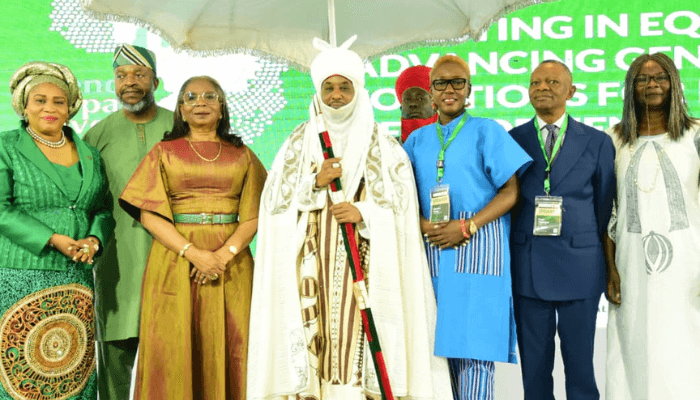…calls for 50% female recruitment, 40% senior management representation
Muhammad Sanusi II, the Khalifa of the Tijjaniya group in Nigeria and former governor of the Central Bank of Nigeria (CBN), has urged Nigerian banks to take deliberate steps toward women inclusion, calling for a mandatory quota system that would ensure 50 percent of new recruits are women, 40 percent of senior management positions are occupied by women, and at least 30 percent of board seats are reserved for them.
Speaking at the Gender Impact Investment Summit in Lagos, on Thursday, Sanusi said banks and regulators must stop treating gender inclusion as an afterthought, stressing that the issue of women-led businesses and women-led enterprises is a matter of common sense, not complication.

He noted that Nigeria’s financial system cannot achieve full stability and growth unless women are systematically included at every level of decision-making.
According to him, the reluctance to break entrenched barriers is not due to lack of qualified women but because those benefiting from a male-dominated environment are unwilling to let go of their privileges. “We overthink gender inclusion, and then we imagine problems that do not exist. A lot of the obstacles are deliberately placed there,” Sanusi said.
Drawing from his own tenure as CBN governor between 2009 and 2014, Sanusi explained how he reformed internal policies to accelerate the promotion of qualified women into leadership roles. At the time, the CBN had only four women who had ever reached the director level in its 50-year history.
“I found that many women were eligible but had been overlooked because of rigid rules. So I changed the system. Instead of requiring three years as deputy director before promotion, I reduced it to one year and personally reviewed CVs of all qualified female officers,” he recalled.
That deliberate action, he said, led to the appointment of nine female directors in one year, many of them heading traditionally male-dominated portfolios such as banking supervision, internal audit, and risk management.
The same principle, should guide today’s commercial bank, Sanusi argued, even as he called for institutionalized quotas across the industry: 50 percent of new intakes to be female, 40 percent of senior management staff to be women, and 30 percent of board positions to be reserved for them.
He credited the “Year of Women in Banking” initiative launched in 2012, which pushed for gender-balanced recruitment, as the seed that led to the emergence of nine female bank CEOs in Nigeria today.
Nigeria lags behind countries like Rwanda and Liberia, where deliberate policies have yielded remarkable representation of women in leadership. Rwanda, which has one of the highest rates of female political participation globally, has over 60 percent of its parliamentary seats occupied by women.
Similarly, Liberia, which produced Africa’s first elected female president, Ellen Johnson Sirleaf, has shown how women in top leadership can influence governance priorities and economic recovery. “If post-conflict Liberia could entrust national leadership to a woman and benefit from her stabilizing reforms, what excuse do Nigerian banks have for not entrusting their financial systems to qualified women?” Sanusi asked.
Sanusi argued that just as Rwanda’s gender quotas in politics have become a global case study, Nigerian banks should become a reference point for Africa in driving gender equity in finance.
The former CBN governor stressed that without regulation and transparency, progress would remain slow. He proposed that the CBN and other regulators such as the Securities and Exchange Commission (SEC) should mandate financial institutions to publish disaggregated data on how many female-led businesses they finance.
“Banks may not be forced to lend to women, but if they are compelled to disclose their records, the public and investors can see which banks are truly gender-friendly. Market discipline alone will push institutions to do better,” he said.
He further urged regulators to ensure that every city in Nigeria has at least one wheelchair-friendly branch and to rethink policies around maternity leave and flexible work. “Before COVID-19, banks said remote work was impossible. But during the pandemic, even CEOs worked from home. If this is possible, why can’t young mothers be allowed to balance career and childcare?”
Sanusi admitted that resistance to women inclusion often comes from entrenched cultural norms and fears of displacement. He recalled that when a bankers’ committee presentation once showed a future board composed entirely of women, many male executives opposed it, thinking women intended to kick them out. “This fear is unfounded. Inclusion does not mean exclusion. It means fairness,” he said.
He also highlighted cultural barriers in Northern Nigeria, where women inherit farmlands but often lose control of them to male relatives. He urged financial institutions to tailor solutions to specific contexts, such as recognizing female land ownership even when men till the farms, so that women can directly access loans and returns.
Sanusi emphasized that women bring unique perspectives to leadership and policy-making. He cited examples of female directors at the CBN who excelled in risk management and supervision, contributing significantly to financial stability.
“In one board meeting, there was a proposal to cut maternity health benefits as a cost-saving measure. It took one female board member to challenge it, pointing out that if we cared about men’s prostate health, we should care about women’s maternal health. Without her voice, that policy would have passed,” he said.
He challenged Nigeria’s banks, regulators, and policymakers to move beyond rhetoric and adopt bold quotas similar to those in Rwanda’s parliament or Liberia’s political history, adding that, “If we can do it at the central bank, we can do it across the financial sector. Diversity is not charity, it is a necessity for resilience and growth.”
The push for gender equity in Nigeria’s banking sector comes at a time when the Impact Investors Foundation (IIF), Nigeria’s leading platform for unlocking impact capital today unveiled the groundbreaking Gender Equity and Social Inclusion (GESI) Roadmap 2025 -2035.
This decade-of-action blueprint for gender equity and social inclusion in Nigeria was launched at the third Gender Impact Investment Summit (GIIS), themed, “Investing in Equity: Advancing Gender-Led Solutions for Inclusive Development,” held at the Civic Centre in Lagos. The launch also introduced the Nigeria Inclusive Capital Commitment 2035 campaign to drive actionable plans towards the GESI roadmap’s ambitious goals.
In collaboration with PricewaterhouseCoopers (PwC) Nigeria, the IIF developed a 10-year strategic roadmap from 2025 to 2035 to embed inclusive investment practices within Nigeria’s economy. The GESI Roadmap presents a clear, actionable plan with targets such as mobilising $8.0 billion in cumulative gender-inclusive capital, the launch of 40 inclusive financial products for women, youth, and PwDs, 90 percent integration of Gender Equity and Social Inclusion principles by General Partners, mobilisation of $1.5 billion domestic capital pools, and the enactment of 20 new policy and regulatory instruments, among others.
The Nigeria Inclusive Capital Commitment 2035 campaign was introduced to inform, shape, and inspire strong capital mobilisation commitments and action for women, youth, and People with Disabilities (PwDs). It aims to galvanise all stakeholders, including governments, providers and absorbers of capital, market builders, enablers, and financial intermediaries, towards achieving the set targets.
Delivering his goodwill message at the third annual Gender Impact Investment Summit (GIIS), Frank Aigbogun, chair of the Impact Investors Foundation, said the gathering marked a decisive shift from aspiration to accountability in closing Nigeria’s gender financing gap.
Aigbogun noted that this year’s theme, “Investing in Equity: Advancing Gender-Led Solutions for Inclusive Development,” underscores the urgency of embedding gender equity into the nation’s growth agenda. He described the unveiling of the Gender Equity and Social Inclusion (GESI) Roadmap, a decade-long blueprint developed with PwC Nigeria, as a historic moment, aimed at mobilizing $8 billion in inclusive capital by 2035, with $1.5 billion expected from domestic sources, while ensuring 90 percent integration of GESI principles among general partners.
The chair stressed that the Roadmap and the Nigeria Inclusive Capital Commitment 2035 campaign are not social add-ons but economic imperatives. “Financial exclusion for women, youth, and Persons with Disabilities is a constraint on national growth,” Aigbogun declared, adding that dismantling barriers will unlock vast, untapped potential and make Nigeria’s growth both rapid and equitable.
He urged stakeholders, from government and capital providers to financial intermediaries, to sign on to the Commitment and embed inclusivity into every investment decision. “Let us embrace this Roadmap and build a gender-inclusive economy where prosperity and social impact are two sides of the same coin,” he said, while commending partners including PwC Nigeria, the Ministry of Women Affairs, the Ministry of Youth Development, RISA Fund, and FCDO for sustaining momentum in this decade of transformation.
“This GESI Roadmap is not just a plan; it’s a blueprint for a significant shift in Nigeria’s economy. The scale of the targets underscores our profound commitment to a future where no one is left behind. This incredibly exciting moment sets a powerful, decade-long course to democratize capital and transform our investment landscape for women, youth, and People with Disabilities (PwDs),” stated Etemore Glover, CEO of the Impact Investors Foundation.
By signing the Nigeria Inclusive Capital Commitment 2035, stakeholders pledge to take several key actions: mobilize inclusive capital at scale to close gender and inclusion financing gaps; introduce GESI principles into investment decisions, policies, and financial products; strengthen institutional capacity, pipeline development, and policy coherence; and deliver measurable outcomes that empower women, youth, and PwDs across Nigeria.
Ibukun Awosika, chair, GSG Nigeria partner and vice chair, GSG Impact, emphasised the campaign’s significance stated, “The GESI roadmap moves us beyond aspiration to accountability, demanding that stakeholders not only mobilize inclusive capital at scale but also embed GESI principles into every investment decision and policy, thereby enabling the gaps to be closed, unlocking Nigeria’s full economic potential, and ensuring our growth is truly equitable and transformative.”
Jessica Espinoza, CEO of 2X Global, a global industry body for gender lens investing, delivered a powerful keynote address, stressing that, “Progress is strategic, not accidental, which is why the GESI roadmap is a critical blueprint for Nigeria’s future. It’s a vital framework for intentionally dismantling financial barriers, empowering women, youth, and people with disabilities, and unlocking the nation’s full economic potential.”
The summit featured goodwill remarks from renowned speakers, panel discussions, fireside chats, and presentations from notable figures in the financial, business, and policy sectors.
In a direct move to facilitate real-world investments, the summit also featured a dedicated, in-person deal room. This unique platform provided a direct pipeline for investment-ready, women-led, and women-owned businesses to connect with capital providers, including impact investors, fund managers, and development finance institutions.
This roadmap was developed with vital support of several distinguished institutions and organisations, including PwC Nigeria, GIZ, the Ministry of Women Affairs and Social Development, the Ministry of Youth Development, and the Research and Innovation Systems for Africa (RISA) Fund funded by UK International Development.
This third Gender Impact Investment Summit, with the launch of the GESI Roadmap and the Nigeria Inclusive Capital Commitment 2035 Campaign, reaffirms the Impact Investors Foundation’s dedication to establishing actionable interventions that build a gender-inclusive economy, driving prosperity and social impact for profit in Nigeria.
Stay ahead with the latest updates!
Join The Podium Media on WhatsApp for real-time news alerts, breaking stories, and exclusive content delivered straight to your phone. Don’t miss a headline — subscribe now!
Chat with Us on WhatsApp








